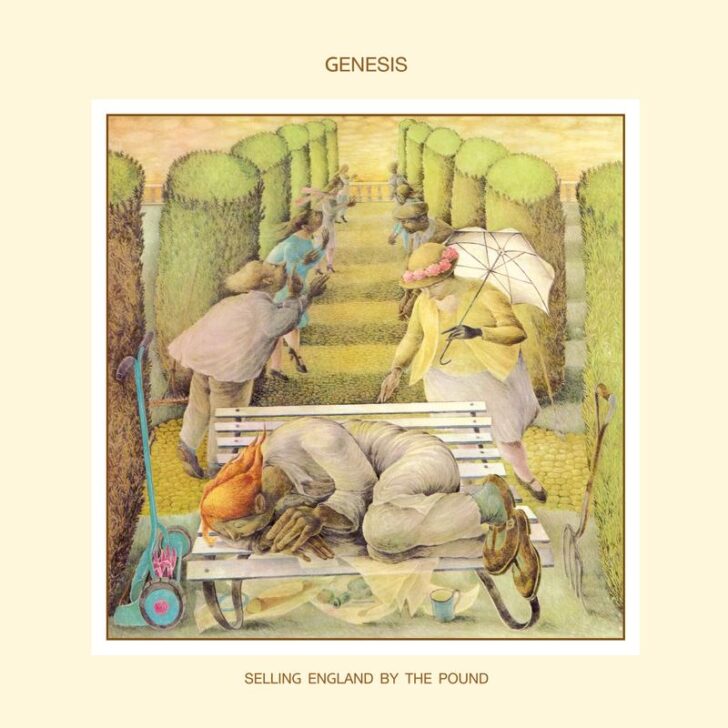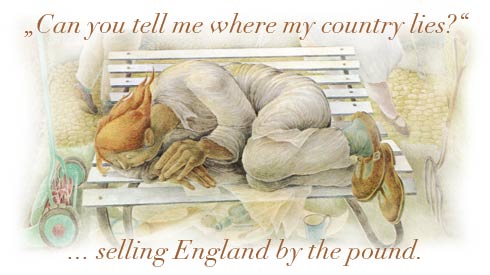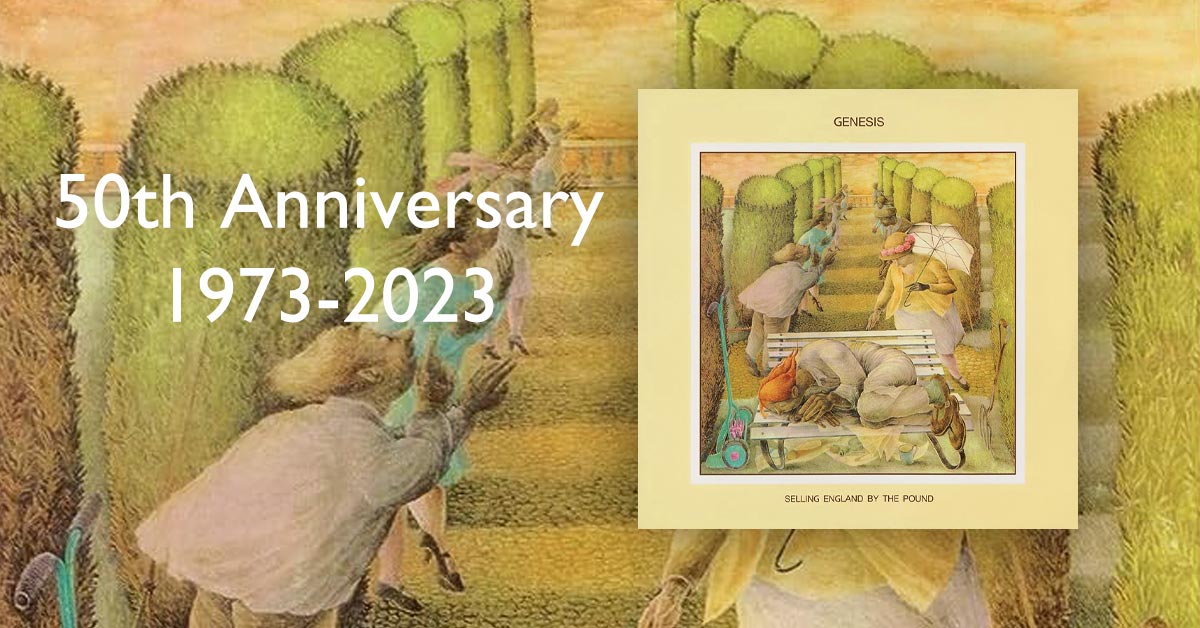- Article
- Read in 8 minutes
Genesis – Selling England By The Pound – review
After their first major successes Genesis produced an album in 1973 that is generally considered one of the best they ever recorded. Steve Hackett describes it as his favourite Genesis album, and some songs from it were still played on the 2007 tour.
Steady work, frequent album releases and almost permanent live performances paved Genesis’ way into the hearts of European and British fans. The band were slowly making the step from an insider band to a cult band with growing numbers of fans. This also meant that expectations grew as well as the pressure the band was under. The next album had to be nothing less than another masterpiece like Foxtrot. It became Selling England By The Pound, a records fans rank among the big classics to this day. During this period tensions in the band began to grow…
Relentless touring to make the band better-known brought them new fans but also had its disadvantages. When the band started writing the successor for Foxtrot they did not have many song ideas. Tony Stratton-Smith decided to close the gap between studio albums with the Live album – a solution the band felt was less than ideal. Between October 1972 and September 1973 Genesis released three albums: Foxtrot, Genesis Live (their first foray into the UK Top Ten) and Selling England By The Pound. Creatively they seemed to have backed into a corner, though. Steve Hackett tried to work his way out of there by disregarding full song structures and experimenting with riffs. One of those riffs he would play endlessly on soundchecks became the basis of I Know What I Like. Steve Hackett was very involved in the writing process, in part also because it allowed him to flee from his marriage problems. Steve’s input for Selling England became larger than for any album before or after, and he often called it his favourite Genesis album.
Phil Collins, on the other hand, found the band’s situation and the hard-going work on the new album frustrating. Mike Rutherford and Tony Stratton-Smith would later admit that they rather feared Phil would leave the band. Instead he found a musical outlet in the short-lived band Zox And The Radar Boys which involved, amongst others, former Yes guitarist Peter Banks. Genesis seemed to lose their spontaneity, their ability to achieve those magic moments when they jammed together. As tensions within the band grew two factions developed, and Steve and Phil frequently found themselves backed into a corner by the other three band members.
The album was finally written in a mere six weeks, with several roads leading to Rome: They had songs that were finished when introduced (e.g. Firth Of Fifth by Tony Banks), they put together songs that were brought by several band members (Dancing With The Moonlit Knight was based on piano pieces by Peter Gabriel and a guitar melody by Steve Hackett). Some songs also developed in jam sessions (Mike, Tony and Phil wrote the instrumental section of The Cinema Show that way). Genesis tried hard not to repeat themselves too much. The plan of merging Dancing With The Moonlit Knight and The Cinema Show into one long song was soon scrapped because the band wanted to avoid comparisons with Supper’s Ready.

The band’s continued cooperation with producer John Burns paid off and resulted in the Genesis record with their best sound so far. The formation had not changed for two years, and these two years of stage experience had finely attuned each musician to the other. It certainly showed on the record. Some even thought it sounded too polished, and the studio sessions for Selling England By The Pound were deemed a little sterile compared to its successors and predecessors; that, of course, would be different in the live performances. The record plays an important role in the history of Genesis. They borrowed the title from the Labour Party’s programme of the time, which pointed at the main theme of the album, i.e. the decline of traditional British culture and the crisis of the British middle class. I Know What I Like became their first pop single and chart success (#21 in the UK charts). The band declined a possible live performance in the British chart show Top Of The Pops. Charisma were shocked, and today the members of the band smilingly remember the youthful arrogance with which they made that decision. Genesis remained an album band, and Selling… is a collection of songs that either became huge classics or are almost forgotten today.
Dancing With The Moonlit Knight
Folky a-capella vocals by Peter Gabriel and soft, broken chords played on 12-string guitar, organ and piano form the remarkable beginning of the album. What begins as a tender acoustic song in the pastoral vein rapidly turns into a dramatic tour de force. This song is like a complete Genesis concert condensed – full of changes in dynamics, speed, rhythm, varied keyboard textures, driving drums and lyrics that are not always easy to understand. It mixes a number of different styles – near the end Genesis even venture into the jazz rock area. The end picks up the markedly pastoral lines from Trespass, but the tender ethereal outro seems like an afterthought tacked on to the rest of the song.
I Know What I Like
Swirling sounds introduce the most unlikely follow-up to these pastoral sounds. Phil Collins’ drumming oscillates between catchy rhythms and fill that could be in jazz rock or even world music pieces. The lyrics satirize the bourgeois British middle class life that comes to life in the narrator’s character of the “lawn mower”. Britishness is celebrated and ironized in a bizarre way. The chorus has sing-along quality but never descends into shallow pop. I Know What I Like impresses by its simplicity – and the chorus offers one of the best Rutherford bass lines ever.
Firth Of Fifth
Tony Banks never sound so classical before. His piano intro brings a new element into Genesis’ music and makes good use of his training on classical piano. The band comes in rather abruptly, but that makes it just all the more impressive. The big guitar and organ sounds and the powerful drumming make the verses sound massive – cinemascope gone music… The flute takes the lead in an instrumental part in Genesis’ pastoral vein which segues into a very prog synth reprise of the piano intro. Phil brings his predilection for jazz rock to bear in his drumming in this part. The drums turn into a marvellous percussive extension or support of the synthesizer melody that moves into Steve Hackett’s most memorable moment in Genesis: The legendary, unending guitar solo that picks up the flute melody and brings it to a whole new level. The music calms down before the melody returns to the verse so that we can listen to Peter’s aphorism, “The sands of time were eroded by the river of constant change”. A song with a perfect structure, the most symphonic piece in the Genesis catalogue, it remained in the live set until 2007, albeit in increasingly mutilated versions. Hackett himself would play it many times in its entirety.
More Fool Me
Another transition full of contrast. From the bombast of Fifth Of Fifth to Phil Collins’ second lead vocal performance in Genesis. More Fool Me is not quite as intimate as For Absent Friends on Nursery Cryme. The subject matter is quite unusual for a Genesis song from that period, because it is a lovesong. Not an infectious piece, but a celebrated solo spot on the tour – and a glimpse at the things Phil and Mike, the writers of this piece, would write later.
The Battle Of Epping Forest
This is probably one of the weakest Genesis songs from the era. The Battle Of Epping Forest attempts to have a go at a more realistic and modern topic, namely gang wars. Tony Banks remembers that they would keep tacking on new parts every day, and it sure sounds like that. Peter Gabriel admits that he lost himself in the story when he wrote the lyrics. In fact, it took Peter so long to write the lyrics that the others completed the backing tracks without melody and lyrics. This would, of course, happen again during the recordings of their next album. There are a number of fine moments such as the brief synthesizer solo or the honky-tonk piano, but the song as a whole is simply stuffed with too many ideas. The music and the lyrics do not really connect. Many passages are pleasant, but they do not leave an overall impression of a complete song.
After The Ordeal
Whether this piece should be included or not was one of the most controversial decisions the band had to make. Neither Tony nor Peter wanted this instrumental of Steve’s on the record. It still made the cut after a bizarre search for a compromise: Peter wanted to cut away the instrumental part of The Cinema Show, too, and to save that Tony voted for Steve’s composition. A wrong decision, it has to be said. The first half of this piece remains pale and pseudo-classic, and it does not become any more relevant when the band comes in for the second half. Not a special highlight of the Genesis discography.
The Cinema Show
A longer song follows those three weaker numbers. The Cinema Show begins in a familiar pastoral acoustic mood. Mike and Steve bring the wonderful pickings on the twelve-string guitar back again just like the early days of Genesis. The vocal melody is catchy without being shallow. A love story, classical epics and mythology meet in the lyrics. The piece moves away from the song and into an instrumental that moves from one glorious climax to another. Tony Banks plays a full-fledged synthesizer solo for the first time, but it is so well woven into Mike and Phil’s rhythm part that it does not become Emersonian bragging but remains an instrumental performed by the whole band (three of them, anyway).
Aisle Of Plenty
The end of The Cinema Show segues smoothly into Aisle Of Plenty, which is not really a song but a collage that reprises melodies from Dancing With The Moonlit Knight. One pun follows the other, but this bit is more of an appendage than a song in its own right.
Selling… was a moderate success for Genesis, but it is less balanced than, for example, Foxtrot. The songs one remembers best from this album are those that became medium classics (Dancing With The Moonlit Knight) or huge classics (I Know What I Like, Firth Of Fifth, The Cinema Show) in the band’s history. As an album, it was not a perfect selection: All longtracks have approximately the same length, while the other songs, with the exception of I Know What I Like, are fillers. Unlike Steve Phil and Tony do not consider the album particularly memorable – they like individual songs, but Tony in particular called the album “ridiculously long”. A playtime of 53:42 minutes is not impressive anymore in the CD age, but at the time it was very long. It became clear in the end that Selling England marked the end of a development that began with Nursery Cryme and Foxtrot. It was thererefore no surprise that Genesis wanted to go into a different direction after this record and the promotion tour. But before that happened Genesis reached #3 in the UK album charts. Genesis had reached a new degree of fame and popularity.
by Jan Hecker-Stampehl
translated by Martin Klinkhardt


